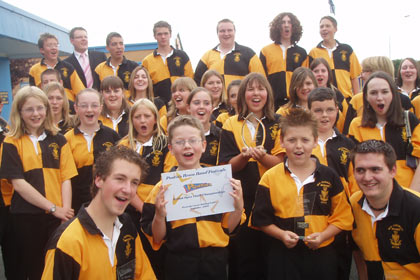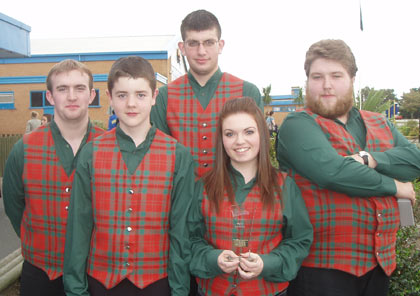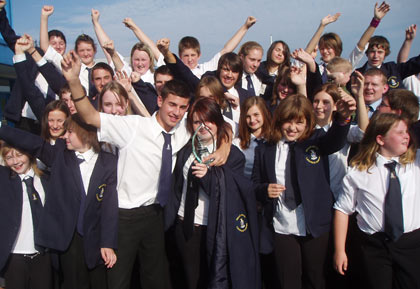2006 Pontins Youth Brass Band Championships - Retrospective
20-Sep-20064BR's Malcolm Wood spent an enjoyable weekend in Prestatyn listening to some great playing and entertainment from the youth bands. The only pity it seems was that there weren't too many people with him to enjoy it all.
Forget the female netball competition, not to mention the pro-am snooker tournament, 4BR was (fully) focused on the Pontins Youth Championships last weekend in Prestatyn
Whilst it had been well documented in advance that there was disappointment from the organisers in the number of bands who turned out here, there can be no argument that those that did, did so with enormous credit, and when you consider that in some cases, rehearsal and preparation for the event was limited – they can be proud of their efforts.

Victors celebrate! Mount Charles Youth enjoy their double win at Prestatyn
Make no mistake this is a contest worth entering with the promoters putting up over £1500 in both of the sections in prize money. The added bonus of being able to call yourselves the British Open Youth Champions might not be significant to some, but it does give an indication that the Pontins Brass Band committee along with support from Colin Morrison, Frank Hodges and their team have a real desire for the event to succeed and give the bands something to strive for. In addition to the prizes, and maintaining the standard set at other major youth contests, all of the bands were awarded a Gold, Silver or Bronze certificate of merit in conjunction with how the judges rated their overall performance.
Everybody concerned knows the crux of the problem in getting the bands to compete is finding that suitable date that suits all parties. That might be like trying to find a needle in a haystack but hopefully something can be sorted so that everybody knows that a particular weekend in the banding calendar is the Pontins Youth Contest weekend. Questionnaires went to the bands here, feedback is welcome to Frank Hodges and his colleagues, and rest assured, everything that can be done will be done to find a date that works.
Assuming the right date is found and more bands attend, the audience has to be better. If you take the supporters of bands away who came to the contest, the attendance was bleak and a real shame. That does perhaps reflect the low key promotion of the event in all sections of the banding press (4BR included), so it should not be blamed entirely on the organizers – everyone should help this event prosper.
How refreshing though to see people come back into the hall having played and listen, and in the case of Mount Charles, the whole band come into the auditorium and listened to their rivals perform.
Whilst it wasn't an entertainment contest; a number of bands opted for entertaining items that they clearly thrive upon playing during their twenty-five minute programme. As long as they played a hymn, a march and the set test, they had free reign – it was all down to what judges Dr Roy Newsome and Denis Wilby thought in the respective sections.
Section A:
A real shame only two bands competed in the top section, but it was a cracking hour nonetheless. Mount Charles were declared the victors overall and they'd been drawn to play first.
The Cornish outfit produced a really bright sound and was extremely polished throughout their performance that was conducted with an awful lot of assurance by Richard Marshall. The Black Dyke maestro was having fun conducting the band again after their victory earlier in the year at the National Youths and Richard's body language transmitted to the players who responded. Victory here see's the Yorkshireman take two British Open titles in the space of eight days and having completed one ‘Open and National' double with the Youth Band, he'll be hoping to emulate this feat with Dyke in October.
Having opened up with ‘Agincourt Song', the band's principal horn, Gavin Pedlar produced a delightful sound in ‘He Ain't Heavy, He's My Brother', which helped him towards taking the ‘Best Horn' award during the contest.
James Curnow's ‘River City Brass Suite' proved a good challenge as the set work and both bands gave fine performances of the work. This was the area of ‘common ground' where the judges could assess the bands. In the case of Mount Charles there was some confident, self-assured playing in all of the three movements; it was evident that time had been spent on getting the dynamics right (particularly movement two – the ‘Hymn') and the final ‘Alleluia' section.
Principal Cornet, Glen Philip was then joined by Charlie Best, Gavin Pedlar and Katie Matthews for an ‘off-stage' quartet to open the hymn-tune, ‘Crimond'. Once again, meticulous detail had been given to the security of the quartet playing setting the tone for the remainder of the hymn. JJ Richards' ‘The Waltonian' was taken at a steady tempo, but again, the clarity and brightness of sound stood out.
The band concluded their programme with ‘Kongolela', arranged by Jon Magne Forde originally for the Stavanger Band in Norway. It's a cracking way to finish a programme; all the chairs and music stands were cast aside as the band lined up and literally let rip Matt Davies on soprano got his moment in the limelight centre stage and it was a case for West Lothian of try and beat it. In addition to Gavin Pedlar taking the best horn prize, Glen Philip took the cornet award and the whole percussion team gained acknowledgement for their efforts too.
West Lothian also gave a very fine account of themselves on the day, picking up the best euphonium, trombone and percussion prizes in addition to a Gold Certificate of merit. They can consider themselves a little unlucky that Mount Charles was in such great form.

Tartan terrors! West Lothian's bass section show off their natty waistcoats
Under the direction of Nigel Boddice, the march ‘Arsenal' written by Jan Van Der Roost (although one suspects it wasn't written in honour of the famous football team) was the band's first item. That had a sense of real assuredness about it and was followed by the set work, ‘River City Suite'. As with Mount Charles' performance this was a fine account, with the ‘Hymn' benefiting from some fine euphonium playing from Isla Cameron that helped her claim the best euphonium prize.
Making their first trip to Wales, it would have been almost unforgivable if the band hadn't played something from their native homeland and ‘Amazing Grace' was perhaps their finest moment.
The Scottish outfit closed with Ray Farr's ‘Adventures in Brass' where some nice sounds were in evidence although there was a hint of tiredness towards the end.
Section B:
Saturday's opening contest was met with glorious blue skies with that real Indian summer feel about the day when no-one really wanted to be indoors. As with the A Section, this was another fine contest with some excellent playing.
Valley Brass (Haydock) came to Prestatyn as the National Champions for the Fourth Section having won in Harrogate last September. Now in the Third Section, it's not unusual nowadays for such a young band to be climbing the Sectional ladder within a region – and this was noted by Dr Newsome who said the winning band had played with great maturity. Led by David Chadwick, the band gave an accomplished display of technical and musical playing to take the ‘B' Section and take home the £600 first prize.

Hands up who thinks we deserved to win - We do! Valley Brass celebrate
The set work in this section was ‘Towers and Chimneys' and ‘Lord of the Dance' from Philip Wilby's ‘Partita – Postcards from Home'. Valley Brass opted to open their programme with ‘Towers and Chimneys' and leave ‘Lord of the Dance' till later on. Although the playing was excellent, splitting the two movements of the ‘test piece' didn't go un-noticed by the adjudicators and whilst it didn't affect the overall result, Dr Newsome did make the point that both movements should really have been played together.
The march, ‘Knight Templar' was bright and very secure before the bands principal cornet, Shaun Holton, stepped forward to play the old ballad ‘I'll Take You Home Again, Kathleen'. The second movement of Partita – ‘Lord of the Dance' proved to be quite tricky for a lot of the bands, but Valley Brass coped admirably.
‘Amazing Grace' was nice on the ear and the band closed with Philip Sparke's arrangement of ‘Pastime with Good Company'. Unlike Stephen Roberts' arrangement, this is an extended version of the popular piece and the band had clearly worked hard on getting everything right. The band's principal euphonium took the ‘best euphonium' prize for some fine playing throughout and conductor David Chadwick was honest enough afterwards to admit the band had ‘worked hard and played well setting them up in good heart for a forthcoming trip to France'.
Youth Brass 2000 took second place, the best horn prize and a Silver Certificate of Merit for an impressive overall display. There programme included Curnow's ‘Fanfare & Flourishes', the Peter Graham arrangement of the hymn tune ‘Crimond' which incorporates snippets of ‘Resurgam' and the march ‘The Great Escape'.
‘Towers and Chimneys' and ‘Lord of the Dance' had their odd moments of uncertainty but the band closed with another Peter Graham work, ‘Dimensions' – a testing work it has to be said of which they gave a good account.
Mark Bousie's Sellers International Youth Band performed a well-balanced programme that has served them well previously in contests. Opening up with ‘When the Saints' without the conductor, an impressive sound was there for everyone to hear.
'Towers & Chimneys' & ‘Lord of the Dance' weren't error free but Sellers finest moments were still to come. Fifteen year old Principal Cornet, Joe Murray gave a demonstration of why he now sits in the cornet ranks at Grimethorpe with a faultless display of ‘Londonderry Air' and the confidence within the band continued to grow with ‘The Contestor', the hymn tune, ‘There is a Green Hill Far Away' and the closing ‘Conquest of Paradise'. Each and everyone of Sellers pieces was aided by a fine bass section and it wasn't a surprise to see them take that award when the results were announced.
Enderby, Shirland & Dobcross Youth all received Bronze Certificates of merit and whilst they were outside of the top three, gave very commendable performances.
Enderby's principal trombone and percussion team took the main plaudits in their contribution. Having opened with ‘Death or Glory', ‘Midnight Euphonium' caused a few nerves for soloist Liz Day and whilst they didn't sparkle like they did at the Action Research Championships in February, they did seem quite at home in their closing item – Stephen Bulla's ‘Kennesaw Mountain Blues'.
Maria Smith's Shirland had drawn number one and never really sounded at their best. ‘Punchinello', and ‘Dear Lord and Father of Mankind' were effective, whilst Ian Beckett played very nicely one of John Clough's familiar solo's during his Black Dyke days – ‘Machusla' and in addition to the test piece, closed with ‘Mr Sandman'.
Ted Griffiths led Dobcross Youth in the march ‘Pennine Way', ‘The Trolley Song', ‘Li'll Darlin', and the hymn tune, ‘Ann'. Alice Nowicki demonstrated a nice sound (albeit a few nerves) in ‘I Hear You Calling Me', and the test piece apart, their finest moment was in the final section of Alan Fernie's popular test piece, ‘Anglian Dances'.
As was said right at the beginning, this was an enjoyable weekend with some fine playing and it has the potential to grow as an event in time with more bands in attendance. Pontins commitment to banding is first class and they'll work hard to find a suitable date now to secure the contest's long term future. Everyone in the brass band movement should offer as much support to it as possible.
Malcolm Wood















